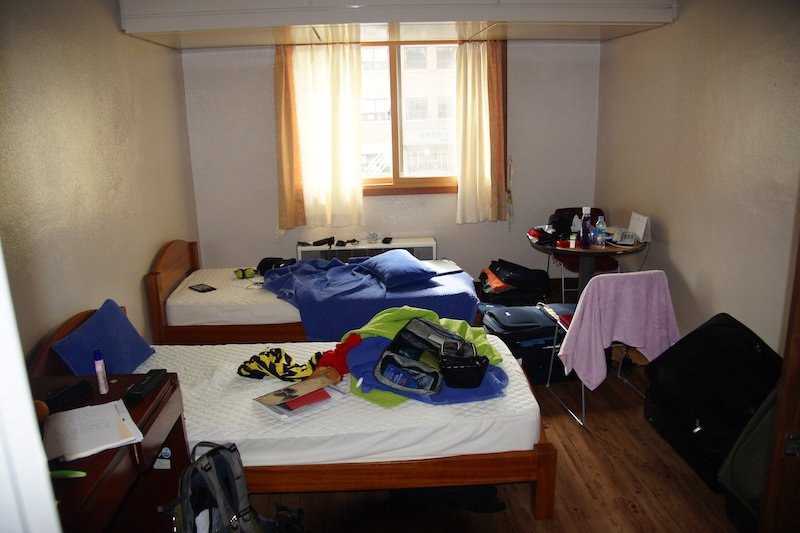Today we’re going to be talking about the pros and cons of TEFL (Teaching English as a Foreign Language) abroad. We all know someone who’s either currently teaching abroad or has taught abroad, and if you’re reading this, maybe you too are considering doing so at some point.
Teaching English abroad can be a great adventure, but getting used to living in a new country, can also bring some unexpected challenges once the excitement of the first few weeks begins to fade.
That’s why in this blog post, we’re going to talk about the pros and the cons of teaching overseas, so that you have a better idea of what to expect once you’re finally ready to take the leap.
Let’s get started, shall we?

The Pros of TEFL
The package
Depending on what country you’re from, and what country you’ll be teaching in, the salary jump can be quite significant. Countries in the Middle East and East Asia are known to be good places to make money and save money.
If saving money is a big priority, you may want to check out this list of the highest paying countries for teaching English abroad. However, keep in mind that salaries aren’t the only thing to consider. Many countries will offer teachers a package that may include things like reimbursed flights, contract bonuses, settlement allowances, rent-free apartments, paid vacation and health insurance. It’s worth taking the time to really consider your options and figure out what’s best for you.
As an example, I had been offered a high-paying teaching job in Tokyo, however, I would have been responsible for my rent, which is quite pricey in that city! The job I was eventually offered in Korea paid a bit less, but because that package included a free apartment, at the end of the day I was able to save more money. I spent a year in Korea and was able to save $17,000 teaching English.

Experience a new culture
One of the main reasons why I was so interested in teaching English in Korea is that I wanted to travel and experience a different part of the world, and this job allowed me to do exactly that!
Even though I was working 40 hours a week, I had the mornings to myself (I typically worked 1:30-9:30 p.m.), plus I also had the weekends to go explore Seoul and go on mini-adventures across the country.
During my year in Korea, I visited the port city of Busan, walked through the green tea fields of Boseong, attended a mud festival in Boryeong, wandered through the bamboo forest in Damyang, climbed the fortress in Suwon, and so much more!

Language immersion
Another reason to consider teaching overseas is to learn the local language.
Admittedly, it wasn’t my goal to become fluent in Korean during my year there, but I did pick up some phrases and I also taught myself to read hangul (the Korean alphabet), which made the world of a difference when trying to order food and figure out which buses I needed to get on.
If you’ve been wanting to learn a particular language, immersing yourself during a year of teaching abroad may be the right move. Plus if your students are anything like mine, they’ll be so amused by any new words you learn!
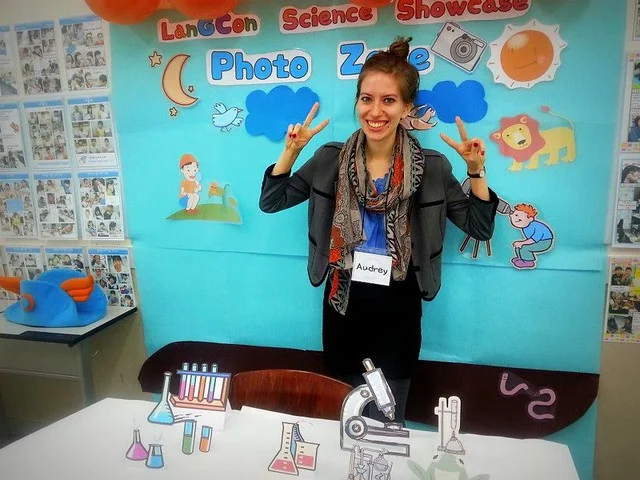
Testing the teaching waters before committing
If you’re thinking about making teaching your career, a year teaching English as a foreign language can be a great way to test the waters and see if it’s something you’d like to pursue. Plus, you’ll also gain valuable teaching experience, which will make a difference when you apply to a teaching program.

I ended up getting my Bachelor of Education after teaching in Korea because I really enjoyed my experience abroad and I thought an international teaching career might be a route to pursue.
I may have ended up working in travel and tourism instead (passions can change!), but I’m still glad I went back to get that degree, and I know that my previous teaching experience made a difference when it came to being accepted into a very competitive program.
A more affordable way to see the world
Another pro is that teaching English is a great way to see the world!
An accredited TEFL certification, like the one offered at TEFL.org, can open a flexible career path and make you employable in many countries. I’ve known several people who have made a career of teaching English around the world, switching up countries every few years, and getting to travel and experience new destinations.
With the demand for English increasing across this globalized world, there are so many jobs available to teachers.
The Cons of TEFL
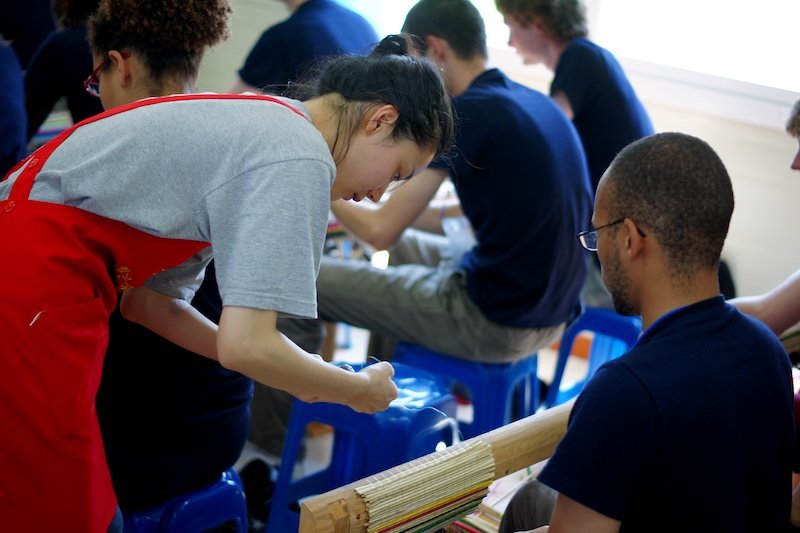
Culture shock
There’s no doubt about it, there will be some culture shock!
Thinking back to my first weeks in Korea, I quickly learned to remove my shoes and switch over to slippers when entering a home, I learned to use both hands when handing over cash or my credit card, and I learned that you never stick your chopsticks into a bowl of rice!
When you land in a new country, you need to accept that things will be different – the language, the mannerisms, the food, the traditions.
It can feel a bit overwhelming at the beginning when you’re still learning what you should or shouldn’t do. There will even be times when you find yourself feeling homesick for your family, friends, and the familiarity of home, but it’ll pass.
The best thing you can do is try to make friends and plan fun outings, after all, isn’t that why you moved halfway around the world?

Loneliness
One of the cons of teaching English abroad is that many relationships can be transient in nature. People come and go, especially if you make friends with other foreigners who are there on a 1-year teaching contract.
At the language academy where I worked, we had 6 foreign teachers but our contracts had all started at different dates, so over the course of that year, we said many goodbyes but also welcomed other new teachers.
Friendships can feel a bit fleeting in that regard, but that is the nature of teaching overseas. All you can do is make the most of your time together, and if you like to travel, you will have friends to visit across the globe!

Sticking out
Being a foreigner in a foreign land can mean you get a lot of stares, especially if you find yourself teaching in a rural area.
This can feel a bit weird at first, but the staring is usually just out of curiosity. Living in Yongin, I did get the occasional point of the finger followed by waegook, meaning foreigner, but I understood it’s because there weren’t many of us around.
In fact, I taught in a city where there were so few foreigners at the time, that whenever I did encounter one in the street it was a big deal that involved some frantic waving followed by chatter:
Where are you from? How long have you been here? And, oh my gosh, you’re the first foreigner I’ve seen aside from my co-workers!
Not what was promised
Another con of teaching abroad is that you may discover that what you were promised isn’t what you end up getting.
While this is extremely rare, there’s always the small chance that you may end up in a school where the employer ignores their contractual obligations, or the picture they painted over the Skype interview proves to be far from the reality you encounter.
This was certainly a concern of mine before I took my teaching job in Korea, which is why I decided to go through a recruiter who had previous experience with my new employer, plus I chose to work for a language academy that was an established name and had multiple locations. I also checked that my school wasn’t blacklisted – there are forums where previous teachers post their nightmare experiences warning others.
It’s better to do your due diligence so there are no major surprises when you arrive.
So there you have it, some food for thought. Like with any job, there are some pros and cons to teaching English as a foreign language, but if this is something you’ve been wanting to do for a while, then why not give it a go?
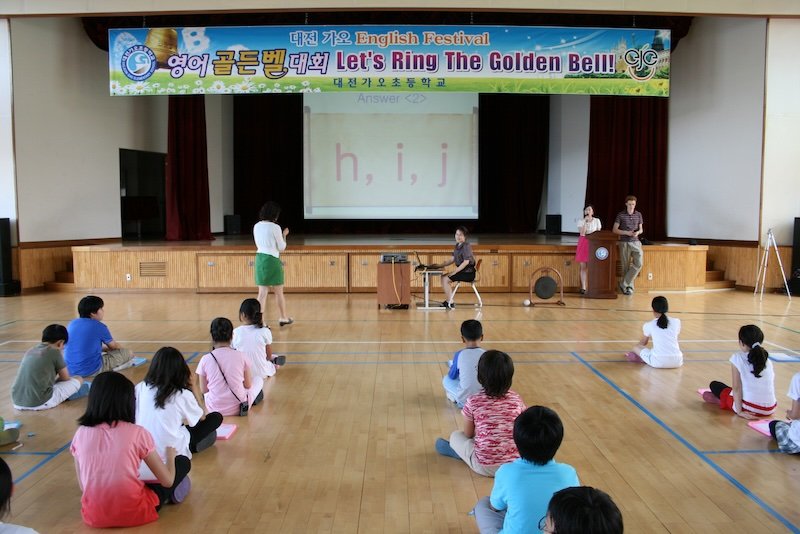
TEFL Abroad Planner: From First Idea to Signed Contract (and a Happy Year Overseas)
Where Should You Go? (Packages, Savings & Vibes at a Glance)
Choosing a country is part math, part mood. You want a package that fits your goals (save money, travel, learn a language, build a resume) and a lifestyle you’ll enjoy. Here’s a high-level comparison to help you narrow the field:
Typical Packages & Savings Potential by Region
| Region / Country | Typical Salary (USD equiv.) | Housing | Airfare / Bonus | Hours / Schedule | Savings Potential* | Vibe Snapshot |
|---|---|---|---|---|---|---|
| South Korea | $1,900–$2,500 | Usually provided or stipend | Roundtrip + contract bonus common | 22–30 teaching hrs/wk (afternoons/evenings common in hagwons) | High (I saved $17k in a year) | Convenience culture, great transit, solid teacher network |
| Japan | $2,000–$2,800 | Rarely included; rent is pricey | Partial airfare/bonus varies | 20–30 hrs/wk | Medium (rent eats budget) | Ultra-safe, orderly, weekend trip heaven |
| Taiwan | $1,800–$2,400 | Sometimes stipend | Bonus varies | 20–30 hrs/wk | Medium–High | Friendly, food-obsessed, scooter life |
| China (major cities) | $2,200–$3,000+ | Often included | Flights + bonus common | 20–25 hrs/wk | High | Big city energy, rapid change |
| Vietnam | $1,500–$2,200 | Not included (affordable) | Flights rare; end bonuses sometimes | 18–25 hrs/wk | Medium–High | Café culture, motorbikes, strong expat scene |
| Thailand | $900–$1,400 | Not included | Rare | 18–24 hrs/wk | Low–Medium | Beaches + temples; save less, live well |
| UAE / Saudi | $2,800–$4,500+ | Usually provided | Flights + significant bonuses | 20–25 hrs/wk | Very High | Tax-free salaries; conservative culture |
| Spain (auxiliares) | $800–$1,200 stipend | Not included | No | 12–16 hrs/wk | Low (great for lifestyle, not savings) | Long lunches, travel around Europe |
| Czechia / Poland | $1,100–$1,600 | Not included | Rare | 20–25 hrs/wk | Low–Medium | Fairytales + EU base for travel |
| Mexico / Chile | $900–$1,500 | Not included | Rare | 18–25 hrs/wk | Low–Medium | Warm culture, Spanish immersion |
*Savings potential assumes shared housing, local food, and steady hours. Your mileage will vary based on city, taxes, and lifestyle.
How I’d choose: If saving is a top priority, Korea, China, Taiwan, and the Gulf usually win. If culture/lifestyle and easy regional travel are the dream, Japan, Spain, Vietnam, and Thailand are crowd-pleasers.
Which School Type Fits You?
Different school types mean different schedules, expectations, and perks. Match your personality and goals to the right environment:
Public vs Private vs Everything Else
| School Type | Best For | Pros | Cons |
|---|---|---|---|
| Public Schools (gov’t programs like EPIK, JET) | First-timers who want structure | Paid vacation, set hours, local co-teacher, stable pay | Slower pace, larger classes, less control over placement |
| Private Language Centers / Hagwons | Night owls + those who want higher earnings | Potential for overtime, smaller classes, city placements | Evening/weekend hours, quality varies—do your due diligence |
| International Schools | Licensed teachers | High salaries, great benefits, professional growth | Credential and experience required |
| Universities | MA holders/experienced | Light teaching loads, academic calendar | Competitive, lower base pay in some countries |
| Camps / Short-term | Students/teachers on break | Fun, short commitment, quick cash | Intense days, temporary |
| Online TEFL | Digital nomads or side hustles | Location-independent, flexible | Variable pay, platform policies change |
Reality check: If you’re brand new and want guardrails, public programs are gentle landings. If you’re flexible and salary-driven, a reputable language academy can be great—just vet them thoroughly.

TEFL, TESOL, CELTA…Which Certificate Should You Get?
You’ll see a lot of acronyms. Here’s what actually matters: hours, practicum (observed teaching), and recognition.
Certification Snapshot
| Certificate | Hours | Intensity | Who It’s For | Notes |
|---|---|---|---|---|
| TEFL/TESOL (120 hr) | 120+ | Self-paced to blended | Most entry-level jobs | Standard baseline; choose an accredited provider with tutor support and real lesson planning |
| CELTA (Cambridge) | 120 + practicum | Very intensive (4–5 wks) | Those eyeing competitive schools or long-term ESL/EFL | Highly regarded globally; pricier but great training |
| DELTA | Advanced | Modular | Experienced teachers | For career ESL progression (Do later if you catch the bug) |
Do I need a degree?
Some countries require a bachelor’s degree for visas (Korea, Japan, Taiwan, parts of the Middle East). Others are flexible (Vietnam, Cambodia, some EU private schools), but a degree broadens options. If you don’t have one, look to online teaching, volunteer programs with training, or countries with looser requirements and build a portfolio.
Money Matters: Sample Monthly Budgets
Numbers vary by city and season, but here’s a ballpark to help you picture cash flow.
South Korea (mid-size city, housing provided)
- Income: $2,100
- Utilities + Wi-Fi: $120
- Transit: $40
- Groceries: $220
- Eating out / cafés: $180
- Phone plan: $25
- Travel / fun: $200
- Savings target: $1,200–1,400
Spain (auxiliar in a medium city)
- Income (stipend): $1,000
- Rent (room in flat): $400
- Utilities + Wi-Fi: $80
- Groceries: $180
- Transit: $40
- Eating out / cafés: $140
- Travel / fun: $120
- Savings target: $40–$80 (supplement with private tutoring to grow this)
Vietnam (HCMC or Hanoi)
- Income: $1,800
- Rent (shared nice apartment): $300
- Utilities + Wi-Fi: $60
- Groceries: $160
- Eating out / cafés: $180
- Motorbike + fuel: $60
- Travel / fun: $200
- Savings target: $700–$900

Recruiter or Direct Hire?
There’s no single “right” way, but there are trade-offs:
Pros & Cons
- Recruiter
- Pros: Hand-holding through paperwork, access to multiple schools, free service (they’re paid by schools), cultural advice.
- Cons: Quality varies, they may push schools that suit them, not you. Stick to reputable agencies and ask for multiple options.
- Direct Hire
- Pros: You evaluate schools one-by-one, negotiate directly, see how they communicate.
- Cons: More admin, slower if you’re brand new and don’t know where to look.
My hybrid: Apply to government programs and a couple of vetted recruiters and keep a spreadsheet of direct-hire postings. Compare offers side-by-side before deciding.

Interview & Contract Checklists
Interview Questions You’ll Be Glad You Asked
- What are teaching hours vs office hours?
- How many students per class? What ages/levels?
- Is there a curriculum and materials? Who buys supplies?
- Training and observations in the first month?
- How are schedules set? (Split shifts? Evenings? Weekends?)
- Overtime rate and how it’s approved?
- Vacation days and how they’re taken (fixed vs flexible)?
- Visa sponsorship and timeline support?
- Can I email a current foreign teacher at your school?
Red Flags (Walk Away If…)
- Vague or unwilling to share contacts of current teachers.
- Demands that you arrive on a tourist visa and “sort it later.”
- Unpaid training beyond a short orientation.
- Hidden housing deductions or deposits you can’t recover.
- Split shifts that run from early morning to late evening with long unpaid gaps (common in some language centers—only you know if that’s a dealbreaker).
Offer Comparison Sheet
- Salary (gross/net) • Hours (teaching/office) • Housing (provided/stipend/none) • Bonuses (signing/end of contract) • Health insurance • Vacation days/holidays • Visa fees (who pays?) • Location/commute • Start date/contract length • Probation terms
Visas & Paperwork
- Passport: 6+ months validity beyond your contract.
- Degree & TEFL certificate: Notarized and apostilled if required.
- Background check: Start early; processing times can be slow.
- Medical check: Some countries require on arrival, others pre-departure.
- Contract: Signed before you fly (ideally); keep a PDF and hard copy.
- Multiple passport photos: Handy for forms and transit cards.
Your Timeline: From “I Want To Teach” to Boarding the Plane
- 6–8 months out: Pick regions; start TEFL course if you need it; research school types; refresh your CV (highlight youth work, tutoring, coaching, camp experience).
- 5–6 months out: Apply to programs (EPIK/JET deadlines are early!); contact recruiters; set up informational chats with teachers in-country.
- 3–4 months out: Interview rounds; request sample contracts; verify school legitimacy; begin background check and document legalization.
- 2–3 months out: Sign offer; ship documents; book flights (if not provided); look at starter housing if needed; budget buffer for landing costs.
- 1 month out: Vaccinations/meds sorted; international bank setup; scan/store documents in cloud; pack smart (see checklist below).
- Week of: Screenshot directions to your school/housing; offline maps; emergency contacts; small local currency for arrival snacks/transport.
Classroom Survival Kit: First 90 Days
Simple Lesson Skeleton You Can Reuse
- Warm-up (5–10 min): Quick game, picture prompts, “Two Truths & a Lie.”
- Target language (10–15 min): Present vocab/grammar with examples.
- Guided practice (10–15 min): Pair work/dialogues with sentence frames.
- Production (10–15 min): Role-plays, problem-solving, mini-presentations.
- Wrap-up (5 min): Exit ticket or “One thing I learned today is…”
Behavior Management That Actually Works
- Routines from Day 1 (entrance, materials, noise level signals).
- Non-verbal cues: Proximity, hand signals, call-and-response.
- Clear expectations: 3–5 class rules posted and practiced.
- Positive narration: “I see Ana ready with her book open…”
- Fast finishers: Always have extension tasks ready (vocab bingo, comic strips).
Culturally Responsive Teaching (Wherever You Are)
- Sprinkle in local holidays, landmarks, foods as discussion starters.
- Invite students to teach you a word/phrase each class (they love it).
- Keep visuals high and instructions concise for multilingual groups.
Building a Life Abroad (So You Don’t Feel Lonely)
- Say yes to staff dinners and awkward first invites—you’ll find your people.
- Join language exchanges, hiking clubs, or sports meetups.
- Find expat teacher groups on social for housing tips and weekend trips.
- Create a mini-routine (Wednesday market, Sunday café) to feel grounded.
- Schedule regular calls home, but don’t spend your nights only online.
Health & Safety Basics
- Get health insurance that works in your destination (some packages include it; know how to use it).
- Pack a starter pharmacy (pain reliever, antihistamine, rehydration salts, prescriptions with copies).
- Know the emergency number and your nearest clinic.
- Keep a backup bank card separate from your wallet.
Career Growth: After Your TEFL Year
- Stay and step up: senior teacher, coordinator, trainer.
- Upskill: CELTA/DELTA, PGCE/Ed. diploma if you want international schools.
- Pivot to edtech, curriculum design, travel content, or higher ed—the skills transfer well.
- Keep a portfolio (lesson plans, student work, observations) and ask for written references before you leave.
Leaving Well (Future You Will Thank You)
- Give proper notice per your contract.
- Collect experience letters and tax documents.
- Close/switch phone and internet; settle utilities; cancel gym.
- Ship or sell what you won’t take; donate teaching props to your successor.
- Share a classroom handover doc—it’s good karma.
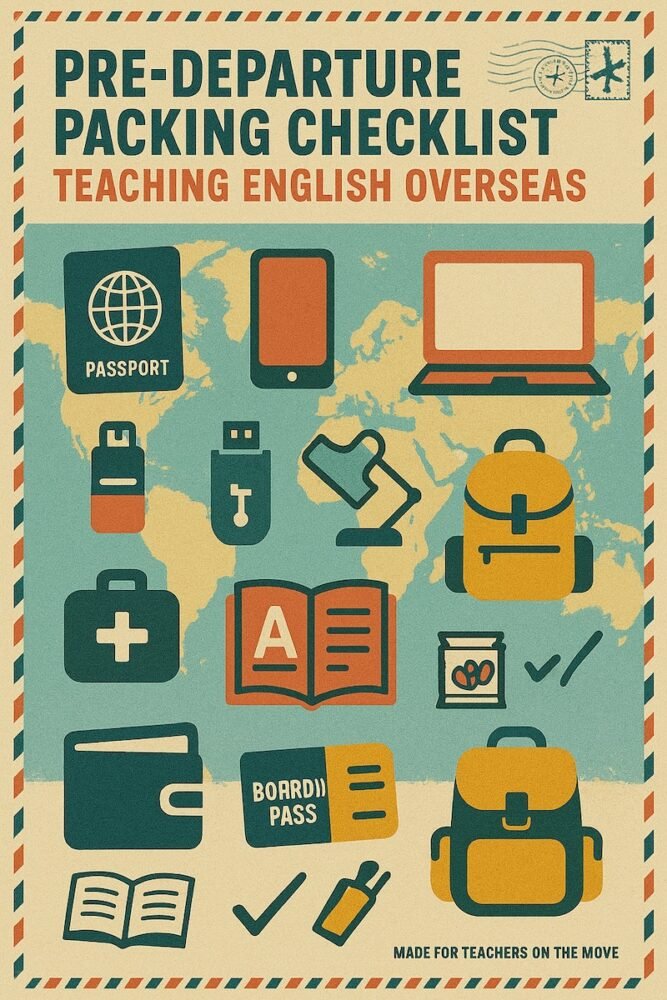
Pre-Departure Packing Checklist
Documents & Money
- Passport (+ copies), visas, contracts, TEFL certificate, degree copies, passport photos, travel insurance, emergency contacts, two debit/credit cards.
Work & Tech
- Lightweight laptop/tablet, USB with lesson templates, universal adapter (check plug type), noise-canceling earbuds/headphones, portable charger.
Clothes & Comfort
- Mix-and-match work outfits, layers for classrooms (AC can be Arctic), comfy shoes, packable rain jacket, quick-dry towel, familiar snacks for the first week.
Classroom Props
- A small set of markers, sticky notes, dice/cards, a few printable games (or files saved offline).

TEFL Abroad FAQ
Do I really need a 120-hour TEFL to get hired?
A 120-hour certificate is the accepted baseline and will make you more competitive, especially if you lack prior teaching experience. Some countries and better schools won’t consider applicants without it, so it’s a smart investment even if you’ve tutored informally.
Is CELTA “worth it” over a regular TEFL?
CELTA is excellent, especially if you want robust training or plan to move into competitive markets and higher-tier schools. It’s intensive and pricier than many TEFLs, but the observed teaching practice and global recognition are big pluses. If you’re testing the waters, a solid accredited TEFL is enough to start.
How far in advance should I start applying?
Six to eight months ahead is ideal for government programs and countries with longer visa processes, while private language centers often hire three months out. It never hurts to start research early so your documents are ready before interviews.

Can I teach abroad without a bachelor’s degree?
A degree is required for work visas in several countries, but there are exceptions and alternatives. You can look to places with flexible visa rules, consider online teaching while you build experience, or explore volunteer and cultural exchange options that include training.
How much can I actually save in a year?
It depends on country, city, housing, and lifestyle. In high-savings destinations with housing provided, teachers commonly save four to five figures in a year. In lifestyle-first destinations like Spain or Thailand, you’ll likely break even unless you add side income like tutoring.
Are recruiters free, and should I trust them?
Legitimate recruiters are free to you because schools pay their fee. Many are helpful and reputable, but quality varies. Work with well-reviewed agencies, ask for multiple offers, and insist on speaking to current teachers before accepting a placement.
What’s the difference between teaching hours and office hours?
Teaching hours are the time you’re actively in front of students; office hours are on-site time for planning, meetings, or supervision. Offers can look similar on salary but feel very different depending on how much of each you’re required to do, so clarify both.
How much vacation will I get?
Public schools and universities tend to offer more fixed holidays, while private language centers often provide fewer paid days off. Check whether public holidays are included, how vacation is scheduled, and if there are blackout periods when time off isn’t allowed.

What if the job isn’t what I was promised?
This is rare but does happen, which is why due diligence matters. Protect yourself by getting everything in writing, asking to speak with current teachers, and knowing your contract’s exit clause. If you arrive and the situation is drastically different, document issues and reach out to your recruiter or embassy for guidance.
Is it possible to bring a partner or spouse?
Yes, but it’s logistically easier if both of you have jobs. Some countries offer dependent visas, while others don’t. Budget for a single income unless your partner plans to teach, and confirm housing arrangements since provided apartments can be studio-sized.
How do I handle homesickness and culture shock?
Expect an emotional dip after the first few weeks. Build routines you enjoy, say yes to social invitations, create a cozy home base, and plan small trips to look forward to. Staying connected with family and friends helps, but try to anchor yourself in your new community, too.
Can I transition from TEFL to an international school career?
Absolutely. Many teachers start with TEFL, then earn a teaching license or education diploma and move into international schools with higher salaries and benefits. Keep collecting experience, seek professional development, and ask for references you can use later.


